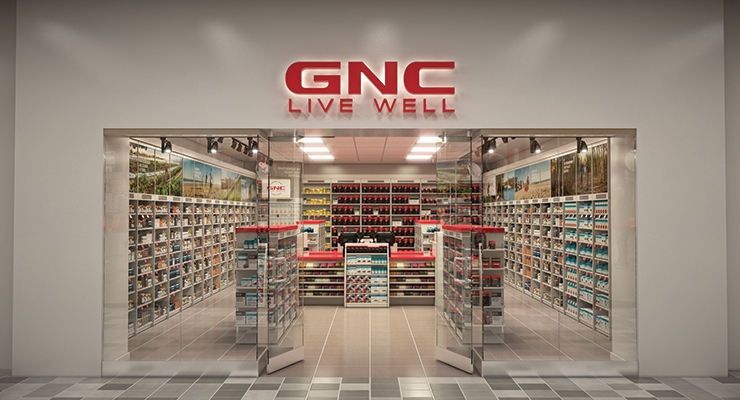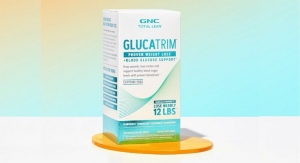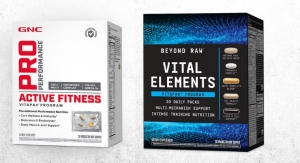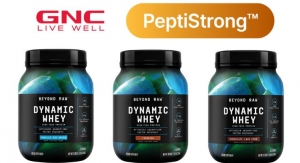By Sean Moloughney, Editor10.02.17
Facing the reality of modern retail and e-commerce, executives at GNC Holdings, Inc., Pittsburgh, PA, believe high quality and innovative products, corporate integrity and accountability, along with clear focus on customer demands will help position the global specialty health, wellness, and performance retailer for long-term success.
While GNC reported that its revenue declined about 5.3% for 2016 to $2.54 billion compared to the previous year, the company has made several adjustments, revamping its pricing, rewards programs, and store experience. The company has also hired a new CEO, Ken Martindale, who most recently served as CEO of Rite Aid Stores and president of Rite Aid Corporation, where he was instrumental in leading the company’s transformation, including the roll out of a new store format and an expansion of the company’s loyalty program.
“We believe the supplements industry as a whole is poised for additional growth, including in international markets like China, as consumers look for products that support their health and wellness goals,” said Guru Ramanathan, GNC’s chief innovation officer. “Companies that thrive in this dynamic environment will be those that can consistently provide consumers with high quality and innovative products; that’s a given. But the best and most successful companies, we believe, will be those that can bring a sharp focus on the customer to everything they do while at the same time bringing integrity and accountability to every aspect of their businesses. And that sums up GNC’s approach and commitment to passionately creating a world of health, wellness, and performance solutions inspiring everyone, everywhere, every day to live well.”
General Evolution
In many ways, GNC’s history aligns with that of the modern supplements industry. In 1935, David Shakarian opened the first store in what would become a successful chain of health food and vitamin stores called General Nutrition. His innovative health concept flourished in the steel-making town of Pittsburgh during the 1950s, prompting him to eventually open 30 other stores there. He also began adding vitamins and other health supplements to his product line and expanding operations into other cities, such as New York.
By the 1970s, demand for vitamins and a new generation of healthy foods emerged, and General Nutrition expanded across the U.S. While sales of the store’s original core health food offerings continued to rise during the 1970s, shipments of vitamins and other supplements ballooned to represent about 50% of company sales.
By the early 1980s, Mr. Shakarian had grown from a single shop to a public company with a national network of 1,300 outlets. Today, GNC has approximately 9,000 locations, of which over 6,800 retail stores are in the U.S. (including 2,378 Rite Aid licensed store-within-a-store locations) and franchise operations in approximately 50 countries.
The appointment of new CEO Ken Martindale marks a pivotal point for the company. He succeeds interim CEO Bob Moran, who was elected non-executive chairman of the GNC Board and will work closely with Mr. Martindale to ensure a smooth leadership transition and continued execution of GNC’s transformation plan. As part of the transition, Michael F. Hines will step down as chairman, but will remain on the Board.
Mr. Martindale has extensive operations, sales, marketing, and merchandising experience. His belief is that strong merchandising/assortment drives business partnership resulting in increased collaboration from suppliers/vendors to help build the business and innovate.
“He is a proven leader with deep retail expertise and a clear understanding of the opportunities and challenges GNC faces in today’s environment,” said Dr. Ramanathan. “Under his leadership we expect to continue to strengthen GNC for the future by leveraging the advantages inherent in our model and improving the customer experience with a single pricing strategy, enhanced loyalty programs, and an exceptional in-store experience and innovative products.”
One New GNC
Last December GNC took decisive action on pricing when it launched the One New GNC, eliminating the two-tier pricing structure and making pricing easy to understand for customers.
“Customers reacted positively and quickly, and the sales trends we’re experiencing suggest that they are continuing to respond. Our revamped loyalty program continues to perform well and is giving us access to new customers, improving frequency, and creating a foundation for powerful integrated marketing and customer connections,” said Dr. Ramanathan. “As of the end of July, we had 7.8 million myGNC rewards customers.”
The company’s PRO Access, its premium loyalty offering, has enrolled nearly 325,000 members since its launch in March. “Our core and most profitable customer, the health enthusiast, is responding well to the program, which includes offerings tailored to their individual interest, purchase habits, and needs.”
In the future, private label will be an important opportunity for GNC. “Our own brands are aligned with customer needs exclusive to GNC and allow us to use our manufacturing capacity. We’re working now to expand our most successful brands, including Beyond Raw, VitaPak, GNC AMP, and Total Lean.
Additionally, the GNC Live Well Foundation is committed to supporting a healthier life for people throughout the world. “Our charitable efforts are aimed at improving health through education, research, nutrition, and supplementation, with donations going to a variety of international, national, regional and local programs, as well as emergency giving needs and associate hours’ programs.”
Future Opportunities
Dr. Ramanathan noted that challenges in the dietary supplement industry have been well-publicized, along with concerns about the future of retail. “We believe there is an opportunity for business models like GNC that listen and respond to the customer and give them products and experiences they can’t get anywhere else. We believe the sector also needs to deal with the ongoing impact of the online consumer. Because more than 50% of online products searches happen on Amazon, and of those, 37% buy that product in the store, we believe Amazon is not a death knell for brick-and-mortars, but a great advertising platform that puts us right in the path of countless new customers. Through Amazon and our digital marketing initiatives, we’re working to increase the likelihood that when the consumer surfs social media or searches the web for wellness solutions, they find GNC.”
The company has also adopted new quality control measures and supply chain transparency initiatives. “We are continually striving to improve our quality control and supply chain processes,” Dr. Ramanathan said. “We have implemented new herbal raw material good manufacturing practices with our suppliers and have encouraged others in the industry to adopt these practices as well. In addition, we are working with others in the industry on improving the process by which third-party auditing companies certify that a particular finished product manufacturing facility complies with good manufacturing practices to ensure more consistent audits across the industry.”
Dr. Ramanathan said GNC is committed to its vendors and partners. “They help us to better serve our customers, achieve our goals, and increase the sales and inventory turns on the products in our stores. But, as a recognized industry leader, GNC requires its vendors to be honest, ethical, reliable, and capable of providing products that meet our high standards of quality.”
Ultimately, industry self-regulation involving all stakeholder groups—from the retailer (closest to customer) to raw material supplier (closest to farmer)—is critical to the continued growth of the supplements industry, he continued. “That requires credibly addressing customer needs—bringing safe, pure products to the customer as well as innovative health and wellness solutions. It also requires addressing regulatory needs with actions and responses that are rapid, practical, and stakeholder-led. And it requires addressing industry needs by creating a safe and stable industry environment as well as the roadmap for the next evolution of the industry.”
While GNC reported that its revenue declined about 5.3% for 2016 to $2.54 billion compared to the previous year, the company has made several adjustments, revamping its pricing, rewards programs, and store experience. The company has also hired a new CEO, Ken Martindale, who most recently served as CEO of Rite Aid Stores and president of Rite Aid Corporation, where he was instrumental in leading the company’s transformation, including the roll out of a new store format and an expansion of the company’s loyalty program.
“We believe the supplements industry as a whole is poised for additional growth, including in international markets like China, as consumers look for products that support their health and wellness goals,” said Guru Ramanathan, GNC’s chief innovation officer. “Companies that thrive in this dynamic environment will be those that can consistently provide consumers with high quality and innovative products; that’s a given. But the best and most successful companies, we believe, will be those that can bring a sharp focus on the customer to everything they do while at the same time bringing integrity and accountability to every aspect of their businesses. And that sums up GNC’s approach and commitment to passionately creating a world of health, wellness, and performance solutions inspiring everyone, everywhere, every day to live well.”
General Evolution
In many ways, GNC’s history aligns with that of the modern supplements industry. In 1935, David Shakarian opened the first store in what would become a successful chain of health food and vitamin stores called General Nutrition. His innovative health concept flourished in the steel-making town of Pittsburgh during the 1950s, prompting him to eventually open 30 other stores there. He also began adding vitamins and other health supplements to his product line and expanding operations into other cities, such as New York.
By the 1970s, demand for vitamins and a new generation of healthy foods emerged, and General Nutrition expanded across the U.S. While sales of the store’s original core health food offerings continued to rise during the 1970s, shipments of vitamins and other supplements ballooned to represent about 50% of company sales.
By the early 1980s, Mr. Shakarian had grown from a single shop to a public company with a national network of 1,300 outlets. Today, GNC has approximately 9,000 locations, of which over 6,800 retail stores are in the U.S. (including 2,378 Rite Aid licensed store-within-a-store locations) and franchise operations in approximately 50 countries.
The appointment of new CEO Ken Martindale marks a pivotal point for the company. He succeeds interim CEO Bob Moran, who was elected non-executive chairman of the GNC Board and will work closely with Mr. Martindale to ensure a smooth leadership transition and continued execution of GNC’s transformation plan. As part of the transition, Michael F. Hines will step down as chairman, but will remain on the Board.
Mr. Martindale has extensive operations, sales, marketing, and merchandising experience. His belief is that strong merchandising/assortment drives business partnership resulting in increased collaboration from suppliers/vendors to help build the business and innovate.
“He is a proven leader with deep retail expertise and a clear understanding of the opportunities and challenges GNC faces in today’s environment,” said Dr. Ramanathan. “Under his leadership we expect to continue to strengthen GNC for the future by leveraging the advantages inherent in our model and improving the customer experience with a single pricing strategy, enhanced loyalty programs, and an exceptional in-store experience and innovative products.”
One New GNC
Last December GNC took decisive action on pricing when it launched the One New GNC, eliminating the two-tier pricing structure and making pricing easy to understand for customers.
“Customers reacted positively and quickly, and the sales trends we’re experiencing suggest that they are continuing to respond. Our revamped loyalty program continues to perform well and is giving us access to new customers, improving frequency, and creating a foundation for powerful integrated marketing and customer connections,” said Dr. Ramanathan. “As of the end of July, we had 7.8 million myGNC rewards customers.”
The company’s PRO Access, its premium loyalty offering, has enrolled nearly 325,000 members since its launch in March. “Our core and most profitable customer, the health enthusiast, is responding well to the program, which includes offerings tailored to their individual interest, purchase habits, and needs.”
In the future, private label will be an important opportunity for GNC. “Our own brands are aligned with customer needs exclusive to GNC and allow us to use our manufacturing capacity. We’re working now to expand our most successful brands, including Beyond Raw, VitaPak, GNC AMP, and Total Lean.
Additionally, the GNC Live Well Foundation is committed to supporting a healthier life for people throughout the world. “Our charitable efforts are aimed at improving health through education, research, nutrition, and supplementation, with donations going to a variety of international, national, regional and local programs, as well as emergency giving needs and associate hours’ programs.”
Future Opportunities
Dr. Ramanathan noted that challenges in the dietary supplement industry have been well-publicized, along with concerns about the future of retail. “We believe there is an opportunity for business models like GNC that listen and respond to the customer and give them products and experiences they can’t get anywhere else. We believe the sector also needs to deal with the ongoing impact of the online consumer. Because more than 50% of online products searches happen on Amazon, and of those, 37% buy that product in the store, we believe Amazon is not a death knell for brick-and-mortars, but a great advertising platform that puts us right in the path of countless new customers. Through Amazon and our digital marketing initiatives, we’re working to increase the likelihood that when the consumer surfs social media or searches the web for wellness solutions, they find GNC.”
The company has also adopted new quality control measures and supply chain transparency initiatives. “We are continually striving to improve our quality control and supply chain processes,” Dr. Ramanathan said. “We have implemented new herbal raw material good manufacturing practices with our suppliers and have encouraged others in the industry to adopt these practices as well. In addition, we are working with others in the industry on improving the process by which third-party auditing companies certify that a particular finished product manufacturing facility complies with good manufacturing practices to ensure more consistent audits across the industry.”
Dr. Ramanathan said GNC is committed to its vendors and partners. “They help us to better serve our customers, achieve our goals, and increase the sales and inventory turns on the products in our stores. But, as a recognized industry leader, GNC requires its vendors to be honest, ethical, reliable, and capable of providing products that meet our high standards of quality.”
Ultimately, industry self-regulation involving all stakeholder groups—from the retailer (closest to customer) to raw material supplier (closest to farmer)—is critical to the continued growth of the supplements industry, he continued. “That requires credibly addressing customer needs—bringing safe, pure products to the customer as well as innovative health and wellness solutions. It also requires addressing regulatory needs with actions and responses that are rapid, practical, and stakeholder-led. And it requires addressing industry needs by creating a safe and stable industry environment as well as the roadmap for the next evolution of the industry.”




























